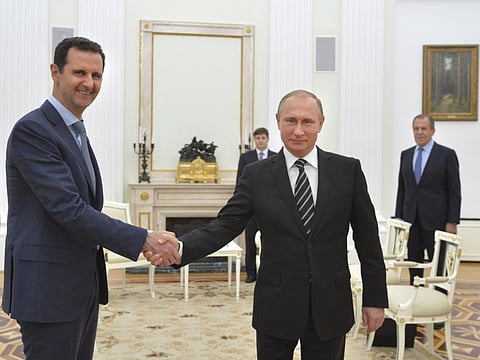Geneva talks will be 'catastrophe' for Syrian opposition
Moscow has convinced Washington to pressure the opposition to make major concessions ahead of talks

Beirut: The upcoming Geneva talks, slated for Thursday, is expected to be a catastrophe for Syria’s opposition. The talks, which were supposed to take place today, were delayed due to last-minute diplomatic wrangling.
US Secretary of State John Kerry who was in Riyadh over the weekend met with Riad Hijab, a senior figure in the Syrian opposition and former Prime Minister, as well as senior Gulf officials.
At the time, the US issued a vague statement saying that Saudi Arabia and the US had reached an “unspecified understanding” on Syria.
Sources speaking to Gulf News, who declined to be named due to the sensitivity of the issue, say that Kerry delivered a Russian ultimatum to the Saudi-backed Syrian opposition.
Hijab, who was named chairman of the Higher Negotiations Committee, was responsible for putting together a 15-person delegation for Geneva.
However, Russian foreign minister Sergei Lavrov, vetoed the list saying participation of groups such as Jaish Al Islam and Ahrar Al Sham would not be accepted.
Russia argues that these Saudi-backed groups are “terrorists”.
Kerry was apparently “won over” by his Russian counterpart during their meeting in Zurich, ahead of the GCC talks.
According to sources, Kerry told Hijab that the opposition was going to Geneva III to negotiate the creation of a cabinet of national unity between them and the Syrian regime.
The opposition would not take over power in Damascus, the sources said, as participating parties set no date for President Bashar Al Assad’s exit.
Also, according to the US-Russia agreement, Al Assad would be entitled to run for a new term in the summer of 2017.
Hijab reportedly expressed deep “concern and surprise” at what he heard from Kerry. This was a dramatic departure for the US and a major shift in the fortunes of the Syrian Opposition.
With no doubt, it is a major victory for Damascus and Moscow.
The opposition, after all, was expecting Geneva III to sign off on what was agreed upon at Geneva I in the summer of 2012, basically, a Transitional Government Body (TGB) that takes over full-powers from Al Assad and replaces him at the Presidential Palace in Damascus.
According to both Kerry and Lavrov, this won’t happen anymore but what the negotiations will produce is a cabinet of national unity between the opposition and Syrian officialdom, along with free parliamentary elections and a new constitution.
As if these harsh realities were not enough, Kerry also bent to Russian pressure and agreed to add the names of three Moscow-backed opposition figures to the Syrian Opposition delegation. This had previously been refused by Hijab and his team but they were forced to accept under US pressure.
The three names are Saleh Al Muslim of the Kurdish Democratic Union Party (whose name had strongly been vetoed previously by the Turks), ex-Prime Minister for Economic Affairs Qadri Jamil, and human rights lawyer Haitham Manaa.
All three men were purposely ignored at the Riyadh Conference.
Third on the list of setbacks for the Syrian Opposition was a joint US-Russian agreement that confidence building measures would take place as a result of the talks in Geneva, and not as a pre-condition.
Both sides assured Damascus that no preconditions would be made before the talks started this January.
The opposition had said that they would boycott Geneva unless there was a release of political prisoners, a halt to aerial bombardment of rebel-held villages and stop to sieges.



